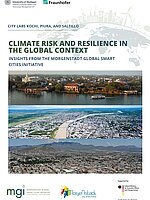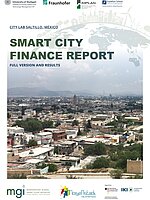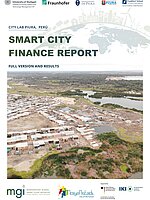Creating resilient cities for the future

The three pilot cities from the IKI project Morgenstadt Global Smart Cities Initiative pursue a common goal: they aim to demonstrate how cities can be created that are well equipped to meet the climatic and social challenges of the future.
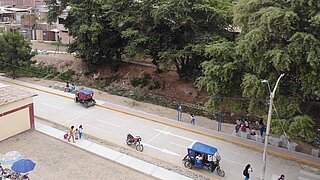
With the implementation of the pilot projects in Kochi (India), Piura (Peru) and Saltillo (Mexico) in June 2023, Morgenstadt Global Smart Cities Initiative (MGI) was also brought to a successful conclusion. This implementation was preceded by a comprehensive analysis phase that began in 2018.
Each pilot project consists of an integrated concept for the sustainable transformation of the city in question. These pilot models were designed with the aim of making the selected implementation areas more resilient versus the impacts of climate change. At the same time, components for social sustainability were also taken into account, by having the opinions and needs of local residents incorporated into the development of the planning design.
All three pilot projects intend to show that sustainable solutions can make cities more resilient versus climate change, more environmentally friendly and more socially integrative – and by taking a global approach leading to solutions tailored to local circumstances.
A systematic approach to understanding cities

Climate change is one of the most pressing issues of our time and cities have a decisive role to play here in achieving international sustainable development goals. To identify innovative and future-oriented solutions for climate-related challenges faced by the pilot cities, MGI researchers used the Morgenstadt method to analyse the initial situation in the three cities.
This method, developed by the Morgenstadt Network from Fraunhofer, pursues a systematic approach in relation to urban environments that involves local actors and builds on synergy effects created between the various partners. The ‘City Labs’ are an interdisciplinary grouping of researchers, specialists and local partners that work together to apply the Morgenstadt method while utilising evidence-based theories and data. This process evaluates the city’s readiness to integrate specific elements with the aim of becoming smarter and more sustainable.
For Kochi, Piura and Saltillo, a separate City Lab Team conducted interviews with local interest groups, specialists and citizens. The aim here was to obtain a high-level picture of the challenges, risks and potential confronting each of these cities as they seek to weaken and adapt to the impacts of climate change.
These interviews led to the creation of a roadmap with various made-to-measure solutions for each problem. This was then used to select a solution as a pilot measure, which was to be implemented during the initiative period.
Tackling flooding, drought and heat in an urban context
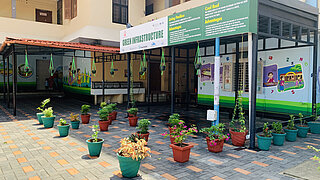
Kochi, Piura and Saltillo are heavily impacted by key effects of climate change such as water scarcity, rainstorms, rising temperatures and periods of drought. In these three pilot projects, the aim was to ensure the sustainable use of water resources, to design public spaces to be greener and better serve community interests, and to offer users a space that is adapted to their needs and shaded from the sun.
All three projects integrate nature-based solutions to improve the user of natural resources. Nature-based solutions mimic natural processes while ensuring key ecosystem services for an urban area – such as the draining of rain water into soil and the cooling of microclimates.
In Kochi, a sustainable neighbourhood was created in Elamakkara locality, with 15 houses being equipped with photovoltaic systems and a nature-based waste water facility being installed in the local high school, with a green pavilion and cool roof. In contrast, the pilot project in Piura concentrated on the transformation of a small, unauthorised refuse dump into a safe and green recreational area for residents of the 18 de Mayo neighbourhood. Lastly, the project in Saltillo transformed a dry area liable to regular flooding in the Las Brisas distract into a park with a small, floodable amphitheatre and rain garden.
Shaping urban concepts with local communities
Local partners and communities in the cities were important for the successful design and implementation of the pilot measures. The urban planning institute in Saltillo (IMPLAN), the city administration and the University of Piura (UDEP), and the Indian National Institute of Urban Affairs (NIUA) together with the Centre for Heritage, Environment and Development in Kochi (C-HED) organised and ran workshops with local residents. This ensured the documentation of their insights, wants and needs in relation to the planned interventions. Based on the information received from local residents, the City Lab Teams then developed the underlying conceptual designs.
Collaboration with local communities and policymaking bodies in the cities is also a key approach to ensuring both the maintenance and the expansion of pilot projects going forward. Activities to raise environmental awareness in city neighbourhoods therefore also formed part of project activities, as did programmes of workshops and webinars for partner communities, on topics such as sustainable urban planning and smart city financing.
The Frankfurt School of Finance and Management also produced comprehensive and detailed reports for each pilot city that set out potential financing options for future sustainable transformation projects.
The link has been copied to the clipboard
Contact
IKI Office
Zukunft – Umwelt – Gesellschaft (ZUG) gGmbH
Stresemannstraße 69-71
10963 Berlin



